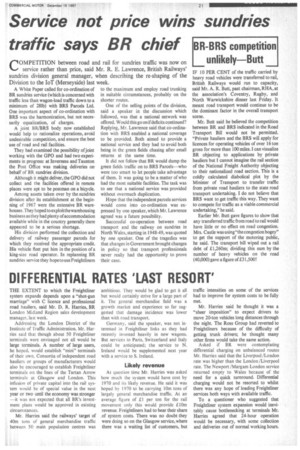Service not price wins sundries traffic says BR chief
Page 23

If you've noticed an error in this article please click here to report it so we can fix it.
BR-BRS competition unlikely Butt
COMPETITION between road and rail for sundries traffic was now on service rather than price, said Mr. R. E. Lawrence, British Railways' sundries division general manager, when describing the re-shaping of the Division to the IoT (Merseyside) last week.
A White Paper called for co-ordination of BR sundries service (which is concerned with traffic less than wagon-load traffic down to a minimum of 281b) with BRS Parcels Ltd. One important aspect of co-ordination with BRS was the harmonization, but not necessarily equalization, of charges.
A joint BRiBRS body now established would help to rationalize operations, avoid undesirable competition, and ensure the best use of road and rail facilities.
They had examined the possibility ofjoint working with the GPO and had two experiments in progress: at Inverness and Taunton the Post Office was making deliveries on behalf of BR sundries division.
Although it might deliver, the GPO did not collect and the facilities offered in remote places were apt to be postman on a bicycle.
Among assets taken over by the sundries division after its establishment at the beginning of 1967 were the extensive BR warehouses. They hoped to exploitthe warehousing business as they had plenty of accommodation available while in the country generally there appeared to be a serious shortage.
His division performed the collection and delivery of railway passenger parcels for which they received the appropriate credit. His vehicle fleet put him in the position of a king-size road operator. In replanning BR sundries service they hope touse Freightliners to the maximum and employ road trunking in suitable circumstances, probably on the shorter routes.
One of the selling points of the division, said a speaker in the discussion which followed, was that a national network was offered. Would this go on if deficits continued? Replying, Mr. Lawrence said that co-ordination with BRS enabled a national coverage to be provided. Both aimed to provide a national service and they had to avoid both being in the green fields chasing after small returns at the same time.
It did not follow that BR would dump the green fields traffic on to BRS Parcels—who were too smart to let people take advantage of them. It was going to be a matter of who had the most suitable facilities. The task was to see that a national service was provided without overmuch duplication.
Hope that the independent parcels services would come into co-ordination was expressed by one speaker, which Mr. Lawrence agreed was a future possibility.
Successful co-operation between road transport and the railway on sundries in North Wales, starting in 1948-49, was quoted by one speaker. One of the tragedies was that changes in Government brought changes in policy so that transport professionals never really had the opportunity to prove 'their case. IF 10 PER CENT of the traffic carried by heavy road vehicles were transferred to rail, British Railways would run to capacity, said Mr. A. R. Butt, past chairman, RHA, at the association's Coventry, Rugby, and North Warwickshire dinner last Friday. It meant road transport would continue to be the dominant factor in the overall transport scene.
Mr. Butt said he believed the competition between BR and BRS indicated in the Road Transport Bill would not be permitted. "Private hauliers and the BRS will apply for licences for operating vehicles of over 16 ton gross for more than 100 miles.! can visualize BR objecting to applications by private hauliers but I cannot imagine the rail section of the National Freight Authority objecting to their nationalized road section. This is a coldly calculated diabolical plot by the Minister of Transport to transfer traffic from private road hauliers to the state road transport undertaking. I do not believe that BRS want to get traffic this way. They want to compete for traffic as a viable commercial undertaking," he said.
Earlier Mr. Butt gave figures to show that any transferred traffic from road to rail would have little or no effect on road congestion. Mrs. Castle was using"the congestion bogey" to get the support of the motoring public, he said. The transport bill wiped out a rail debt of £1,260m; dividing this sum by the number of heavy vehicles on the road (40,000) gave a figure of £31,500!












































































































